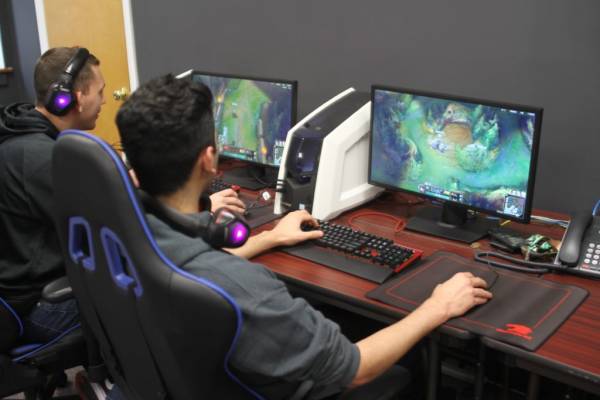College of St. Joseph Unveils eSports Arena
RUTLAND, Vt. (Associated Press) — Thinking it’s odd that College of St. Joseph’s newest team and arena are related to esports may indicate a generation gap.
Tamara Robitille, captain of the College of St. Joseph Archangels eSports team, said her peers, fellow college students, think it’s “really interesting.”
“They want to get in on it. From the staff and from the faculty side of things, there is general confusion about, ‘What is esports?’ ‘What are you guys doing in there with your brightly flashing lights?'” she said.
“But it’s interesting because once you take the time to explain it to them that, ‘Hey, this is like an actual competitive thing,'” Robitille said. “We’re trying to win money and honor, glory, all that good stuff for CSJ, then they get really into it.”
Most Read Nation & World Stories
Christopher Towle, head coach and director of esports for CSJ, said the independent college in Rutland had been working on the creation of an esports team since spring 2017.
School officials said CSJ is the first college in New England to have a varsity-level esports program.
The school recently opened an esports arena in St. Joseph’s Hall with five gaming computers, LED lighting, webcasting and a giant viewing screen for both spectators and team strategy revision. Each gaming station has a mechanical keyboard, headset, gaming chair and 24-inch screen
During the current school year, CSJ joined the National Association of Collegiate eSports, which will facilitate the school’s participation in tournaments.
The team is training to participate in its first tournament, playing the fighting game “League of Legends,” which is expected to take place during the 2018-19 academic year.
There are about a dozen players on the CSJ team, three of them women. Three of the players are also on the baseball team. A team member must be a full-time student at CSJ, in good academic standing, and pursuing an undergraduate degree.
Team members spend about six hours a week practicing, which includes playing the game and reviewing their own performance through watching videos of themselves and teammates playing.
Once the program is in full swing, Towle said he expects the tournament season will be in the spring. Much of the competition is done remotely but Towle said high-performing teams travel for the championship.
Sign up for Evening Brief
Delivered weeknights, this email newsletter gives you a quick recap of the day's top stories and need-to-know news, as well as intriguing photos and topics to spark conversation as you wind down from your day.
The team is focused on training for one game now, but Towle said they will be expanding to other games soon.
Robitille explained why esports is as legitimate as its more traditional counterparts.
“I’m about physically as coordinated as a giraffe that’s just been given birth to, but in my opinion, esports is very much a sport,” she said.
“We are competing against teams, not only for honor, glory, school, but we’re also bringing a little something back to our schools, whether it be money, whether it be recognition, whether it be whatever else a school particularly wants,” she said.
Robitille said esports taught participants about working as a team, deploying each team member’s skills to best effect, learning how to exploit each playing field and other skills that come from participating in team sports.
“It’s not any different than going out for an away game on a soccer team and being very unfamiliar with the kind of ground or terrain that you’re going to be facing or the kind of people you’re going to be facing,” she said.
Another Archangel, Dylan Sorum, a radiologic technology major from Gilman, said the team also needed mechanical skills.
“Not quite throwing a ball or running around, but a lot of knowing what to do, when to do it and how to do it,” he said.
Sorum said the “why” was important as well — before Robitille finished the thought by speaking from the point of view of a player: “(It’s not) ‘I’m throwing the ball because it’s fun.’ (It is) ‘I’m landing the skill shot now because if I don’t, the whole team dies.'”
Sorum said he had started playing videogames when he was 3 or 4 years old, starting with a Nintendo console. He said he had decided to “go pro” with his hobby because “League of Legends” brings out his competitive side.
“Having a group physically there to where we can talk, we can coordinate, we can keep practicing,” he said. “(The team is) a guarantee that they’re always going to be there to practice, compete, what have you. It’s kinda something I’ve been looking for ever since I started playing ‘League of Legends.'”
Towle said he developed the team with the idea of creating an inclusive group. He said he had particular concerns about female students becoming involved because of hostility, sometimes involving graphic threats, toward women coming from some members of the gaming community.
Robitille, Sorum and Towle said they all appreciated being involved with CSJ’s first esports team. Robitille said her hope was the CSJ team could set a standard for tolerance of players of any background and rejection of discrimination.
More than 70 colleges across the country have varsity esports teams recognized by the National Association of Collegiate eSports.
CSJ is recruiting players for next year’s team to compete in other games like “Fortnite,” ”Rocket League” and “Hearthstone.”
College officials are also hoping to engage local businesses with sponsorship opportunities and other promotional partnerships.















